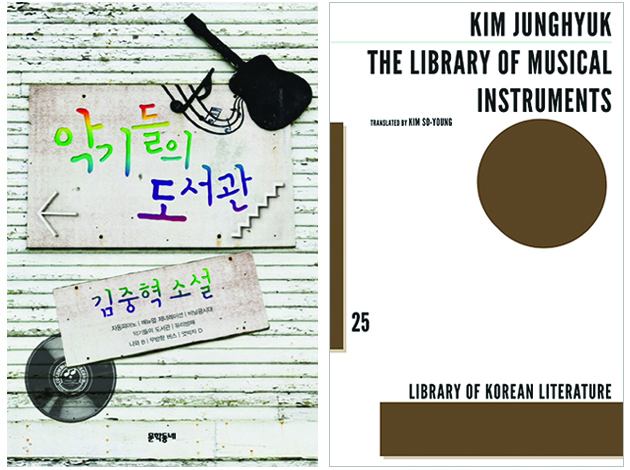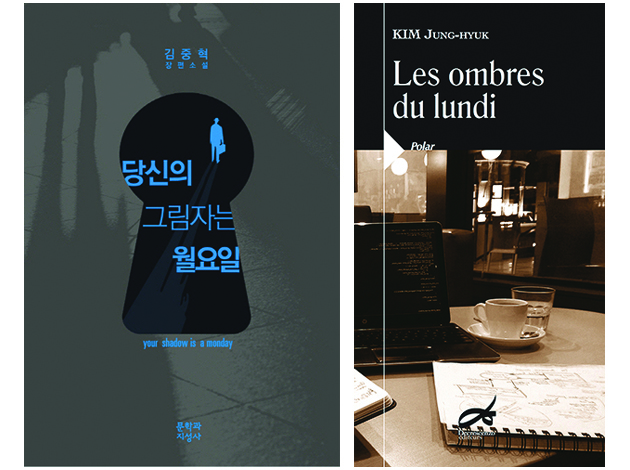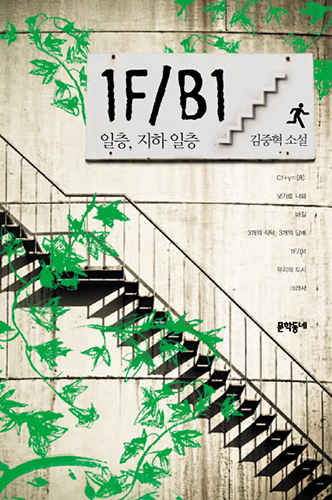|
Interview with author Jung-hyuk Kim All-round novelist with sense of humor and smarts
2018.01
It is not an easy feat melding sharp and piercing insight and bright humor into one piece of literature. Novelist Jung-hyuk Kim, the interviewee of this month's issue, debuted in 2000 with Penguin News and since, he has been publishing novels and essay collections to consistently show his work. He also does work related to cinema while giving lectures and working as a podcast DJ.
KPIPA We are delighted to feature you in our webzine. Can you introduce yourself to industry officials outside South Korea?
Kim I am Jung-hyuk Kim, someone who writes novels. I don't like giving long introductions.
KPIPA Your work is not only loved by Korean readers but those abroad as well. The Library of Musical Instruments has been exported to Japan, France and the United States while Your Shadow is a Monday is also slated to be published in Vietnam, China and Germany after have been published in France. Can you tell us about these two books?
△ Cover art for the Korean and English versions of The Library of Musical Instruments
Kim The Library of Musical Instruments was a work based on the theme of sound. I came about the concept of writing this book after I heard the sound of a piano, thinking "Where do all those sounds go?" I delved into the world of sound and started writing short stories one by one. I dealt with a story of a pianist while in another, I told the story of a person who collects sound. I wrote about a DJ who mixes different sounds. What was most fun about writing this book was that I had to think how I was going to describe the sounds I was hearing in words. Part of the reason why I selected the title for this book was exactly that.
△ Cover art for the Korean and French versions of Your Shadow is a Monday
Your Shadow is a Monday is a novel that features a detective as the main character. Most detectives search for what has been lost, but Dong-chi Ku in the book is a deleter. When he is given a case by someone, he either 'deletes' that item or information. He erases that thing or information from the world completely so no one will no longer know about it. It may be a secret diary no one must know about, or something on the Internet. One of the people who gives Ku a case in the book says this:
“People are bound to leave traces of themselves some way or another. When you look at it, those traces are actually that person. I don't want to be remembered as an untidy person.”
It's important to think what kind of person you want to live as, but I feel contemplating what kind of person you want to be remembered as is also an important thing which also shows the desire of man.
KPIPA Have you had a chance to receive direct feedback from your foreign readers? Do you have an experience that comes to mind?
Kim I had an opportunity to meet readers at a mystery novel library in France. They had many questions about South Korea. I think they were most fascinated by how South Korea was able to make such astonishing developments despite being the only divided country in the world. It was fun how we were able to speak to one another with just the theme "mystery novels" despite our being from different cultures. It occurred to me we may be living in one country called "fiction" where it is not important what nationality we are.
“It would be unfair for me to die without becoming anything. This is what I thought as my body floated up in the air after being hit by a car.”
That reader was a woman who was around 60 years of age. After she read the novel she said she looked back on her life, while going back to that first sentence. She too, felt it would be unfair without having become anything. After she started writing and said her life had changed because of that.
KPIPA You seem to keep writing - long novels, short stories and essays. Where do you get the inspiration for your work?
Kim I don't, so I have to keep writing. If you wait for your inspiration to come, you will never write anything. I feel I am translating all the sensations of life into words and this is why I end up using different genres. When I write essays I feel calm. I only have to softly spill out all the words inside me. When I write short stories, I focus more on my senses and when it comes to long novels, I concentrate on the plot, structure and characters.
KPIPA Previously you worked as a magazine reporter and a web designer and now you're a podcast DJ and even work in cinema. How do all of these roles influence you?
Kim All my experiences lead to novels. If I have a top goal in life, that would be to write a fun novel. In order to write a fun novel you must have diverse experiences. The greats of old either went whale-hunting or out to war in order to write great novels. I can't do that but I try to meet as many people as I can and listen to their stories. I often think novels are eventually the stories of people. I think novels when I listen to other people speak in their own ways.
KPIPA Is there a book you would like to introduce to our foreign readers?
△ Cover art for the Korean version of 1F/B1
Kim If The Library of Musical Instruments was about sound, then 1F/B1 (first floor, first basement floor) is about the city. Seoul is quite a fun city. It's developing quickly but at the same time, there are many dark sides to it as well. The side effects of a city grown too fast can be seen. I feel that mismatch is one of Seoul's attractions and it's a good location to think about mankind and cities. 1F/B1 is a novel where I tried to convey different kinds of humans who live in the city.
KPIPA What plans do you have for the new year? Please tell us if you're planning anything new.
Kim My only plan is to write great novels. There is something in the works at the moment, but currently it's like a ghost with no form. I will eventually see the outline as I do my research, think of people and their stories. The greatest feeling I get as a novelist is when I find the reality of a story. These stories just walk up to me after having seemed impossible. I meet that body of the story, add flesh to it while erasing some parts. I keep adding and erasing to create my story. I'm already looking forward to my next novel.
Organized by Myung-im Nam
|
Pre Megazine
-

Review of Seoul International Book Fair 2017
VOL.1
2017.06 -

Visiting Book Fair Thailand 2017
VOL.1
2017.06 -

Translated and Published in Taiwan, Meet Chin-Myong Kim's THAAD
VOL.1
2017.06 -

Independent Publishing
VOL.2
2017.07 -

A Korean Publisher Growing With the World
VOL.2
2017.07 -

Gilbut Children
VOL.2
2017.07 -

Character Licensing Fair 2017
VOL.2
2017.07 -

The Online and Digital Marketing of South Korea's Publishing Industry
VOL.3
2017.08 -

Golden Bough
VOL.3
2017.08 -

Black Forest
VOL.3
2017.08 -

2017 Korea Book Fair in Vietnam
VOL.3
2017.08 -

Ji-hyeon Lee's Pool
VOL.3
2017.08 -

Characteristics of South Korean Web Novel Platforms and Ventures Overseas
VOL.4
2017.09 -

Publishing Educational Materials for 40 Years “Darakwon”
VOL.4
2017.09 -

Leading the Popularization of Art “Art Books”
VOL.4
2017.09 -

South Korea to Participate in 2017 International Istanbul Book Fair as Guest of Honor
VOL.4
2017.09 -

Haemin Sunim's The Things You Can See Only When You Slow Down
VOL.4
2017.09 -

The Present and Future of South Korea's "Screensellers"
VOL.5
2017.10 -

Humanist Books
VOL.5
2017.10 -

Dolbegae
VOL.5
2017.10 -

The 2017 Guadalajara International Book Fair
VOL.5
2017.10 -

Interview with You-jeong Jeong
VOL.5
2017.10 -

South Korea's Translated Literature Awards, Where Are They Now?
VOL.6
2017.11 -

UU Press
VOL.6
2017.11 -

Risu·Reading Cat Publishing Company
VOL.6
2017.11 -

Asian Publishers Fellowship Program in Seoul 2017
VOL.6
2017.11 -

Interview with author Soon-won Lee
VOL.6
2017.11 -

10 Keywords: South Korea's publishing industry in 2017 at a glance
VOL.7
2017.12 -

"NexusBOOKS"
VOL.7
2017.12 -

"SangSang Publications"
VOL.7
2017.12 -

2017 Bookstore Day
VOL.7
2017.12 -

Interview with Mi-kyoung Song
VOL.7
2017.12 -

Trends and news in South Korea's book design
VOL.8
2018.01 -

Agencies talk actual copyright export cases
VOL.8
2018.01 -

Daewon CI
VOL.8
2018.01 -

K-Books Blossoming in Central America
VOL.8
2018.01 -

Interview with author Jung-hyuk Kim
VOL.8
2018.01 -

Book Factory Dubulu
VOL.9
2018.05 -

Yaong Seoga
VOL.9
2018.05 -

Where Books and People Become Closer
VOL.9
2018.05 -

Interview with author Kim Tak-hwan
VOL.9
2018.05 -

Book Ecosystem Vision Forum - the 3rd
VOL.10
2018.06 -

The Birth of Publishing Company ‘BookGoodCome’
VOL.10
2018.06 -

Diverse Ways to Love Books
VOL.10
2018.06 -

Ha Seong-Ran, An Author Ready to Talk
VOL.11
2018.07 -

2018 Seoul International Book Fair ‘New Definition’
VOL.11
2018.07 -

GOZKNOCK ENT
VOL.11
2018.07 -

South Korea’s Literary Awards
VOL.11
2018.07










